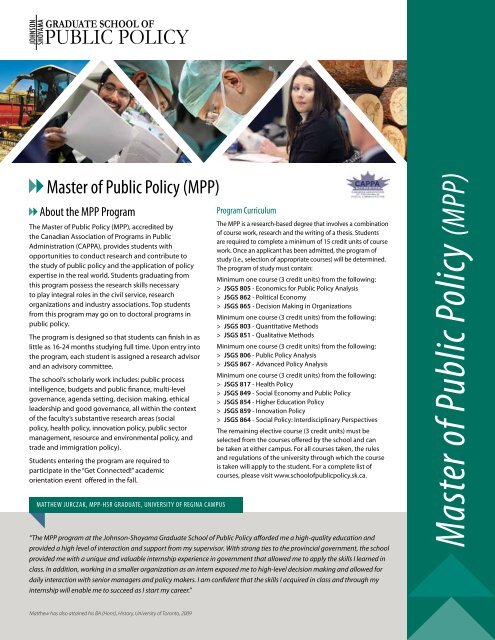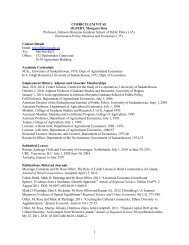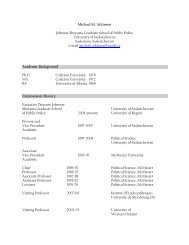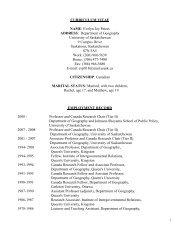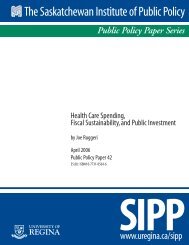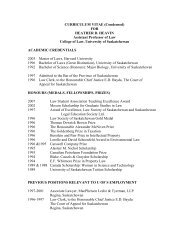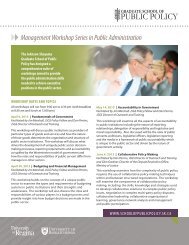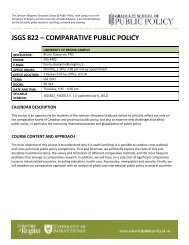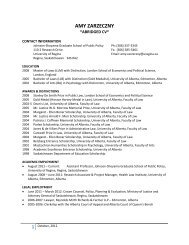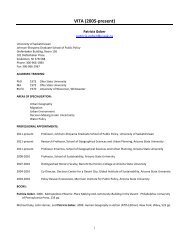Master of Public Policy fact sheet - Johnson-Shoyama Graduate ...
Master of Public Policy fact sheet - Johnson-Shoyama Graduate ...
Master of Public Policy fact sheet - Johnson-Shoyama Graduate ...
Create successful ePaper yourself
Turn your PDF publications into a flip-book with our unique Google optimized e-Paper software.
<strong>Master</strong> <strong>of</strong> <strong>Public</strong> <strong>Policy</strong> (MPP)About the MPP ProgramThe <strong>Master</strong> <strong>of</strong> <strong>Public</strong> <strong>Policy</strong> (MPP), accredited bythe Canadian Association <strong>of</strong> Programs in <strong>Public</strong>Administration (CAPPA), provides students withopportunities to conduct research and contribute tothe study <strong>of</strong> public policy and the application <strong>of</strong> policyexpertise in the real world. Students graduating fromthis program possess the research skills necessaryto play integral roles in the civil service, researchorganizations and industry associations. Top studentsfrom this program may go on to doctoral programs inpublic policy.The program is designed so that students can finish in aslittle as 16-24 months studying full time. Upon entry intothe program, each student is assigned a research advisorand an advisory committee.The school’s scholarly work includes: public processintelligence, budgets and public finance, multi-levelgovernance, agenda setting, decision making, ethicalleadership and good governance, all within the context<strong>of</strong> the faculty’s substantive research areas (socialpolicy, health policy, innovation policy, public sectormanagement, resource and environmental policy, andtrade and immigration policy).Students entering the program are required toparticipate in the “Get Connected!” academicorientation event <strong>of</strong>fered in the fall.MATTHEW JURCZAK, MPP-HSR GRADUATE, UNIVERSITY OF REGINA CAMPUSProgram CurriculumThe MPP is a research-based degree that involves a combination<strong>of</strong> course work, research and the writing <strong>of</strong> a thesis. Studentsare required to complete a minimum <strong>of</strong> 15 credit units <strong>of</strong> coursework. Once an applicant has been admitted, the program <strong>of</strong>study (i.e., selection <strong>of</strong> appropriate courses) will be determined.The program <strong>of</strong> study must contain:Minimum one course (3 credit units) from the following:> JSGS 805 - Economics for <strong>Public</strong> <strong>Policy</strong> Analysis> JSGS 862 - Political Economy> JSGS 865 - Decision Making in OrganizationsMinimum one course (3 credit units) from the following:> JSGS 803 - Quantitative Methods> JSGS 851 - Qualitative MethodsMinimum one course (3 credit units) from the following:> JSGS 806 - <strong>Public</strong> <strong>Policy</strong> Analysis> JSGS 867 - Advanced <strong>Policy</strong> AnalysisMinimum one course (3 credit units) from the following:> JSGS 817 - Health <strong>Policy</strong>> JSGS 849 - Social Economy and <strong>Public</strong> <strong>Policy</strong>> JSGS 854 - Higher Education <strong>Policy</strong>> JSGS 859 - Innovation <strong>Policy</strong>> JSGS 864 - Social <strong>Policy</strong>: Interdisciplinary PerspectivesThe remaining elective course (3 credit units) must beselected from the courses <strong>of</strong>fered by the school and canbe taken at either campus. For all courses taken, the rulesand regulations <strong>of</strong> the university through which the courseis taken will apply to the student. For a complete list <strong>of</strong>courses, please visit www.school<strong>of</strong>publicpolicy.sk.ca.“The MPP program at the <strong>Johnson</strong>-<strong>Shoyama</strong> <strong>Graduate</strong> School <strong>of</strong> <strong>Public</strong> <strong>Policy</strong> afforded me a high-quality education andprovided a high level <strong>of</strong> interaction and support from my supervisor. With strong ties to the provincial government, the schoolprovided me with a unique and valuable internship experience in government that allowed me to apply the skills I learned inclass. In addition, working in a smaller organization as an intern exposed me to high-level decision making and allowed fordaily interaction with senior managers and policy makers. I am confident that the skills I acquired in class and through myinternship will enable me to succeed as I start my career.”<strong>Master</strong> <strong>of</strong> <strong>Public</strong> <strong>Policy</strong> (MPP)Matthew has also attained his BA (Hons), History, University <strong>of</strong> Toronto, 2009
“Strong faculty, a close-knit academic community and competitive funding drew me into the MPP program at the <strong>Johnson</strong>-<strong>Shoyama</strong> <strong>Graduate</strong> School<strong>of</strong> <strong>Public</strong> <strong>Policy</strong>. The quality <strong>of</strong> education has been first rate, and the pr<strong>of</strong>essoriate has encouraged students to go beyond traditional disciplinary lines, toseek innovative solutions to complex problems.”Paul has also attained his BA (Hons), Economics and Political Science, University <strong>of</strong> Toronto, 2007PAUL BRETSCHER, MPP GRADUATE, UNIVERSITY OF SASKATCHEWAN CAMPUSStudents must also register in the two following courses:> JSGS 990 (U <strong>of</strong> S) or JSGS 990AB (U <strong>of</strong> R) <strong>Public</strong> <strong>Policy</strong> Seminar Series(continuous registration required)> JSGS 994 Research (U <strong>of</strong> S - continuous registration required) orJSGS 901 Research (U <strong>of</strong> R)In their first term <strong>of</strong> study, students at the U <strong>of</strong> S campus must alsocomplete GSR 960 Introduction to Ethics and Integrity, while students atthe U <strong>of</strong> R campus must complete GRST 800AA Academic Integrity Tutorial.These are non-credit courses required by <strong>Graduate</strong> Studies and Research ateach campus and are <strong>of</strong>fered at no cost to the student. Students may takeadditional courses in a particular subject area if they wish, subject to theapproval <strong>of</strong> their advisory committee.Health Services Research Stream (MPP-HSR)The <strong>Master</strong> <strong>of</strong> <strong>Public</strong> <strong>Policy</strong> Health Services Research Stream (MPP-HSR) is athesis-based program that equips students with the knowledge to addressthe research needs <strong>of</strong> a wide range <strong>of</strong> health care policy makers, and providesthem with the opportunity to conduct applied health services research. Thisprogram is <strong>of</strong>fered only at the school’s University <strong>of</strong> Regina campus.Students enrolled in the MPP-HSR stream are required to follow thefollowing program <strong>of</strong> study:Three required core courses (9 credit units):> JSGS 803 - Quantitative Methods> JSGS 805 - Economic Analysis for <strong>Public</strong> <strong>Policy</strong>> JSGS 860 - Health System Research MethodsOne <strong>of</strong> the following two courses (3 credits units):> JSGS 806 - <strong>Public</strong> <strong>Policy</strong> Analysis> JSGS 851 - Qualitative MethodsOne course from the following list (3 credit units):> JSGS 817 - Health <strong>Policy</strong>> JSGS 827 - Health Care Organization and Administration> JSGS 832 - Population-Based Health Program Management> JSGS 833 - Performance Measurement in Health-Care Organizations> JSGS 837 - Health EconomicsHealth services research seminar, bi-weekly, fall and winter terms (0 credit units)> JSGS 990AA - expected to attend and participate in at least 80% <strong>of</strong> seminarsThesis research and writing (15 credit units)> JSGS 900 - Thesis, supervised by Canada Research Chair and Pr<strong>of</strong>essorGregory P. MarchildonStudents in the MPP-HSR may also be eligible for funding through theWestern Regional Training Centre in Health Services Research (WRTC). Theapplication process is competitive, and students are selected on the basis<strong>of</strong> academic performance. In addition to the academic requirements <strong>of</strong>the program, WRTC-funded students are also expected to:> attend conferences as directed by WRTC site director;> present their research results at WRTC-sponsored events, institutesand conferences; and> complete a four-month working field placement with one <strong>of</strong> the WRTCpartners.Please note that the MPP program is subject to revision at any time. Forthe most current information on the program, please visit our website.InternshipsThe <strong>Johnson</strong>-<strong>Shoyama</strong> <strong>Graduate</strong> School <strong>of</strong> <strong>Public</strong> <strong>Policy</strong> <strong>of</strong>fers MPPstudents the opportunity to enhance their post-graduate work withan internship in areas such as the federal and provincial public service,municipal and local governments, and in health services research. Themany concrete benefits to interns in the <strong>Johnson</strong>-<strong>Shoyama</strong> ExecutiveInternship Program include initial internship placement, valuable careerpreparation and experience, the development <strong>of</strong> an extensive pr<strong>of</strong>essionalnetwork, as well as accelerated pr<strong>of</strong>essional growth and advancement.Application QualificationsUniversity <strong>of</strong> Regina: To meet the entrance requirements <strong>of</strong> the Faculty<strong>of</strong> <strong>Graduate</strong> Studies and Research, all applicants must have completed afour-year undergraduate degree in any area with a cumulative average <strong>of</strong>at least 75%.University <strong>of</strong> Saskatchewan: Applicants must have completed a four-yearundergraduate degree from a recognized university. To meet the basicprogram requirements, an average <strong>of</strong> 75% or better must be maintainedduring the final two years (60 credit units) <strong>of</strong> the undergraduate programor in the graduate program if students are entering the MPP after agraduate degree.Program CompetitivenessAdmission to the MPP program is very competitive. The number <strong>of</strong>applications received greatly exceeds the number <strong>of</strong> available places,and not all qualified applicants will be <strong>of</strong>fered admission (i.e., successfulcandidates will typically have an average in excess <strong>of</strong> 80% [or lower firstclass]). Typically, six to eight students are admitted each year per campus.Additional InformationStudents will enter the program from a wide variety <strong>of</strong> disciplinesincluding everything from the fine arts to the humanities to thesocial sciences to the physical sciences to the pr<strong>of</strong>essional collegedisciplines. Because concepts derived from micro-economics andstatistics are used in parts <strong>of</strong> the program, students without a backgroundin these areas are encouraged to take additional instruction.Application DeadlinesAll students accepted into the MPP program begin in September.There are two application deadlines: February 1 and May 1.FundingHighly qualified students can expect to receive funding at a competitive rate.To be eligible for funding, students must commit to completing the programover a maximum <strong>of</strong> two academic years. All complete applications receivedby February 1 will be considered for funding. Complete applications receivedby May 1 will be considered for any remaining funding.For more information regarding this program, including courses, prerequisites and tuition, please visit www.school<strong>of</strong>publicpolicy.sk.caPrinted March, 2013


